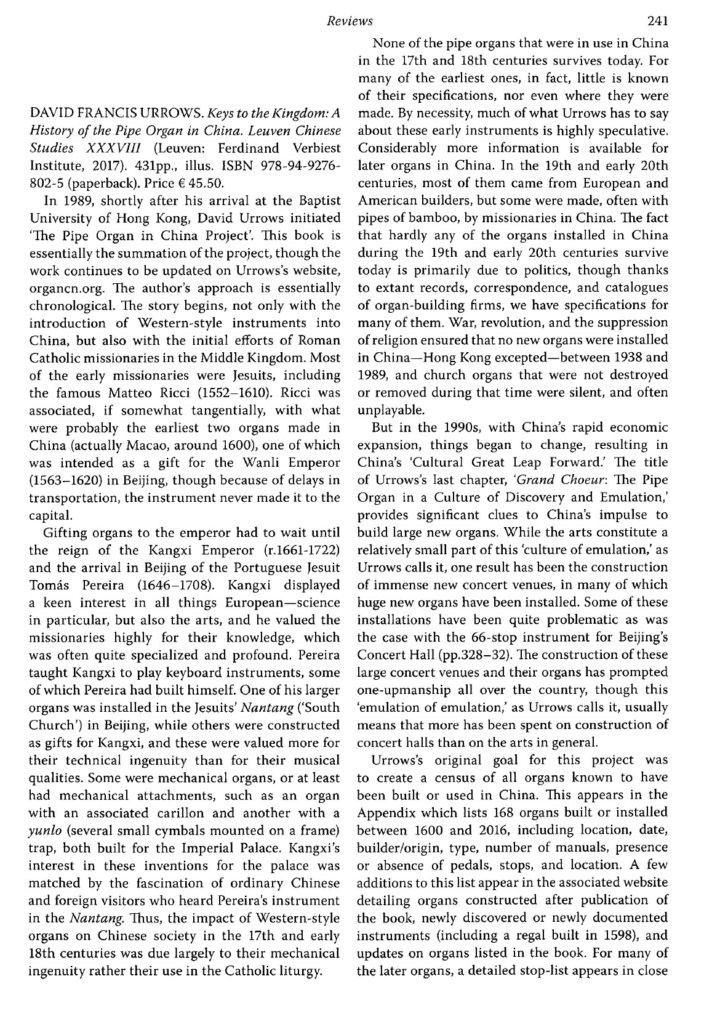Updates to the Pipe Organ in China Project Website for September 2019
29 September 2019- 30th anniversary of the POCP.
September 2019 marks the 30th Anniversary of what became The Pipe Organ in China Project. Prof. Urrows tells the story of how it all started in the Introduction to Keys to the Kingdom. It is perhaps is worth mentioning that the unnamed colleague, whose question about the ‘Bamboo Organ of Tungkadoo’ started the whole thing, is now also retired but very much alive and enjoying (we think with some surprise) the effect of his apparently simple question thirty years ago.
萬歲,萬歲,萬萬歲! man seúih, man seúih, man man seúih!
- Review of Keys to the Kingdom in the Galpin Society Journal.
The first published review of Keys to the Kingdom: A History of the Pipe Organ in China in a ‘scholarly’ publication has recently appeared in the Spring issue of the Galpin Society Journal (http://www.galpinsociety.org/journal.htm), LXXII (2019) pp. 241-242. Written by Prof. Stewart Carter of Wake Forest University, it is for the most part a positive review, and we appreciate Prof. Carter’s close reading of the text. Indeed, he has identified one important theme of the book when he writes that it is not only “an engaging, thorough study of the pipe organ in China…it is more than that. It is also a history of Christianity in China through the ‘lens’ of the organ.”
We would just like to clarify two points. The POCP was founded at Hong Kong Baptist University (or HKBU, as it is now known); it is a Hong Kong government-funded tertiary institution, and has never been known as the ‘Baptist University of Hong Kong’. And Prof. Urrows retired from the teaching staff in 2018, not in 2016, and continues to be affiliated as a University Associate.
- Beijing ‘Organ Festival’.
An “International Organ and Electronic Organ Festival” was held in Beijing between 4 and 8 September 2019. Part of the festival was held at the Central Conservatory of Music (CCOM), and at least one concert was played at the National Center for the Performing Arts (“The Egg”) on PEK2007a.
Just what this festival consisted of is not clear. There is nothing about it on the CCOM website (http://www.ccom.edu.cn/), although there were reportedly recitals on the Rodgers hybrid at CCOM, lectures, and master classes. The inclusion of ‘electronic organ’ and other substitutes for a pipe organ in the title is telling: Rodgers and Viscount were in fact major sponsors, see: https://www.viscountinstruments.com/news/beijing_international_organ/ and
http://www.rodgersinstruments.com/news/rodgers-china. Casavant also sent a representative, and L’ensemble InSpiration from Montréal performed as well.
That this kind of event can be held at all is a big and positive development for organ culture in Mainland China, and these kinds of educational opportunities are much needed. However, it does not seem to have been publicized internationally (even to Hong Kong or Macau), making the ‘international’ aspect dependent upon the presence of a couple of organ and electronic organ manufacturers (and the promotion of their instruments), and a handful of invited performers. We hope one day to see a proper festival (or even a POE, or organ academy) that will really promote the pipe organ, of which there are now plenty in Beijing alone for such an event to be successful. For the time being, however, events like these are probably doing good.
- Meeting with Robert Nield.
In Keys to the Kingdom, reference is made at various points (especially in Chapters 4 and 5) to Robert Nield’s The China Coast: Trade and the First Treaty Ports (2010). This small, but valuable book is largely free of the usual cant and onerous ‘official historical narrative’. It is a refreshing, objective look at a tumultuous and difficult period in East-West relations. Prof. Urrows reports that he had the pleasure of finally meeting Robert Nield himself at an art gallery opening in Hong Kong at the start of September. A cordial conversation followed. We recommend Mr. Nield’s books to anyone interested in this topic.
- Updates to Census pages:
HKG1933a: some updating based on information sent by a colleague in Hong Kong about this two-manual Blackett organ, and an additional report of a choir organ, also at Rosary Church.
YCF1937: there is a small update to this installation following a communication received from the Klais firm in Bonn.
- Census/Hits.
Organs in the POCP Census: 190
Hits as of 29/09/19: 9, 756
